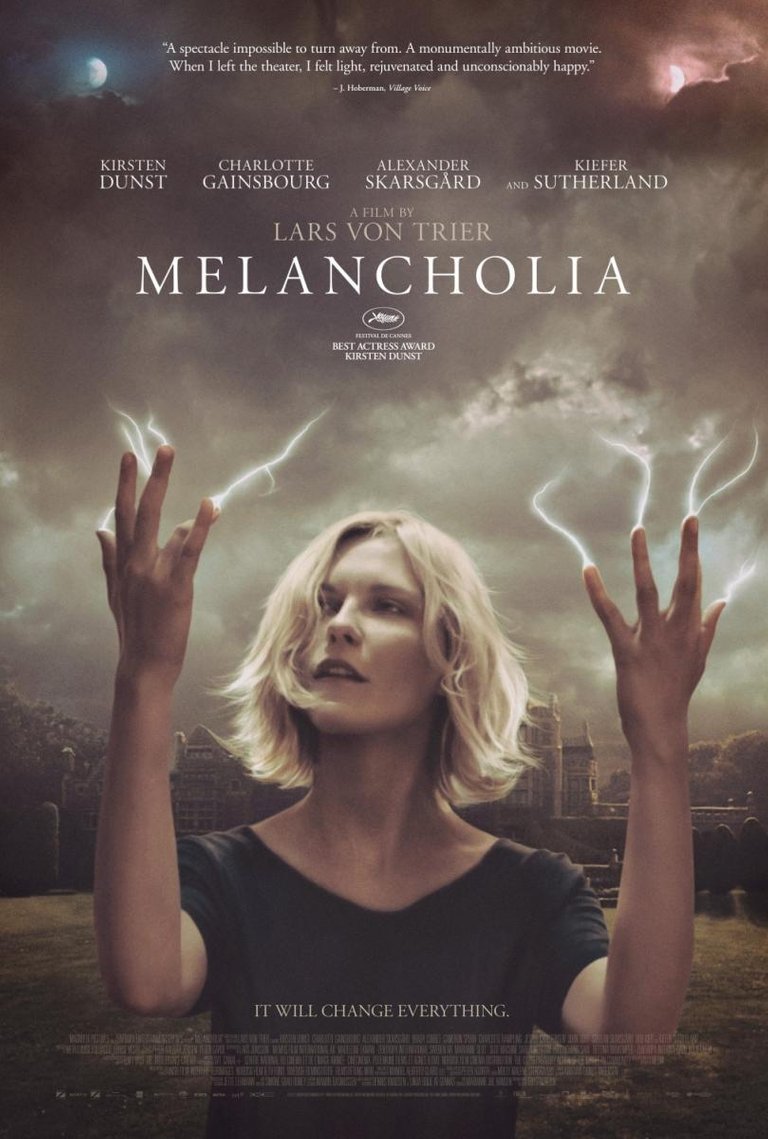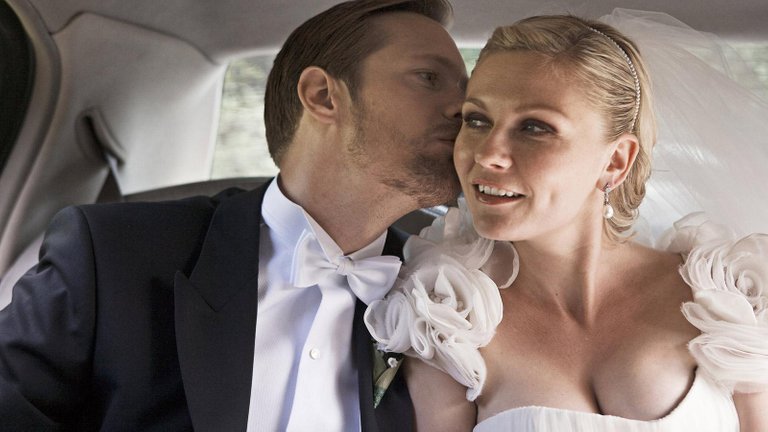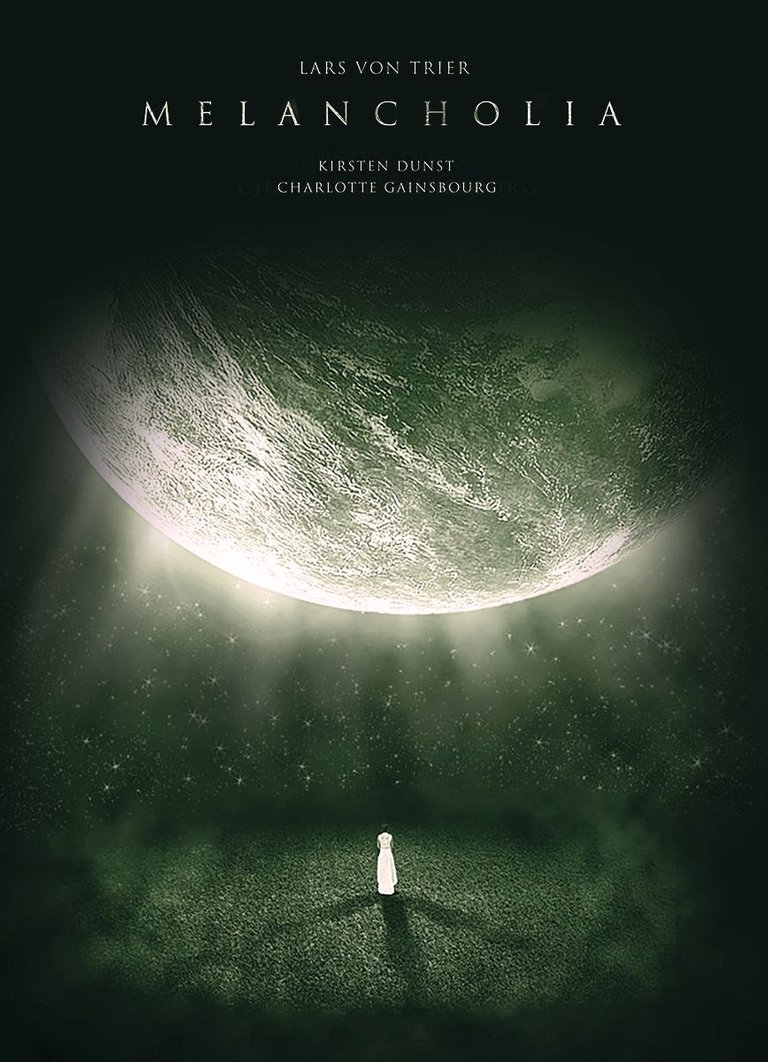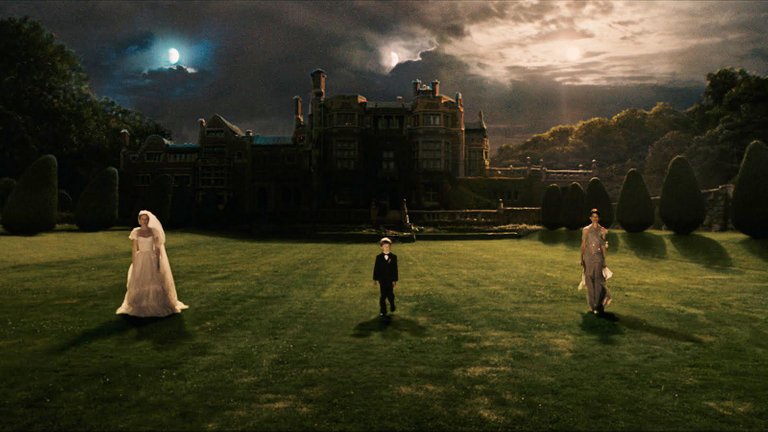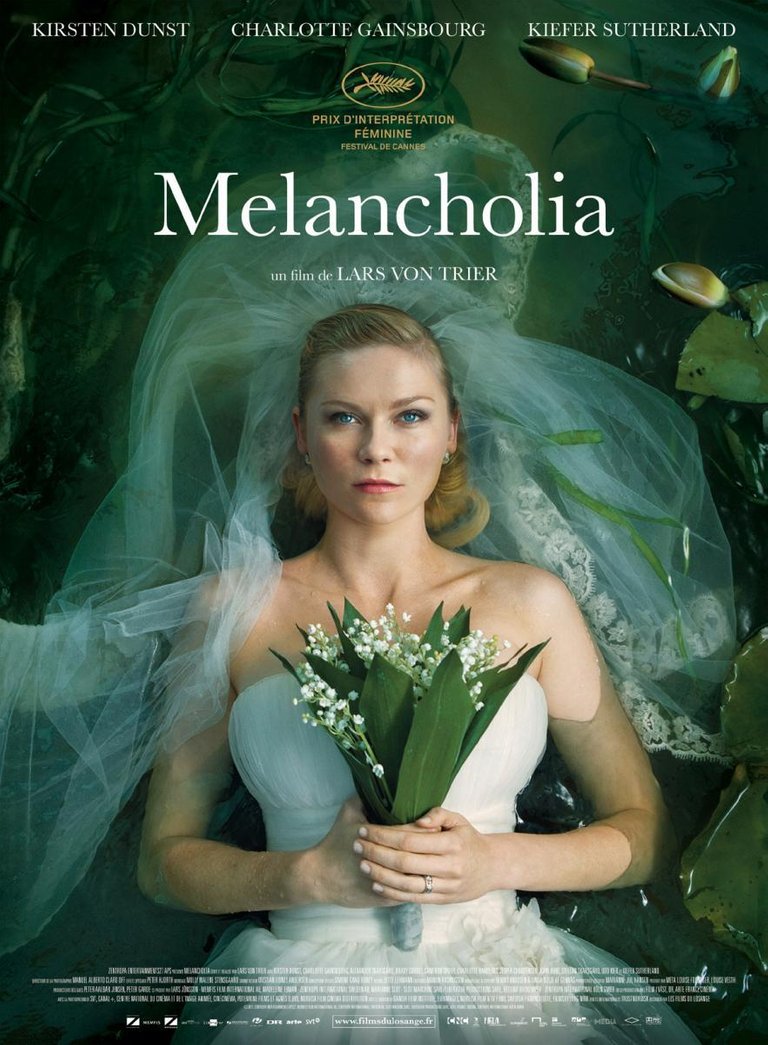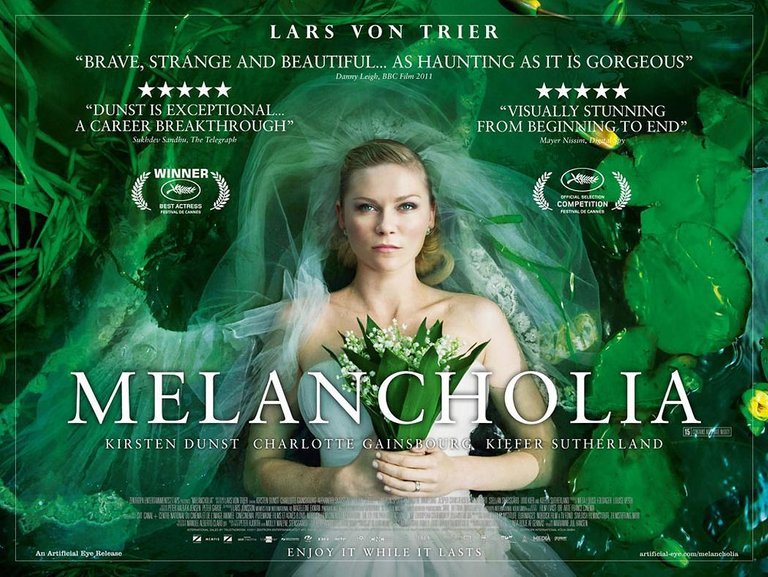
Dirigida por Lars von Trier
Ever since I saw Dogville I had wanted to check out another film by Danish director Lars Von Trier because I was impressed by his work on that story. Although I already had Breaking the waves and Dancer in the dark on my list to see them soon, I took advantage of the fact that a movie theater near my home screened the film Melancholia yesterday afternoon and I went to see it on the big screen, just like those who attended its premiere in 2011.
Desde que vi Dogville había querido revisar alguna otra película del director danés Lars Von Trier porque me impresionó su trabajo en aquella historia. Aunque ya tenía en mi lista Breaking the waves y Dancer in the dark para verlas próximamente, aproveché que una sala de cine cercana a mi domicilio proyectó ayer por la tarde la cinta Melancholia y acudí para verla en pantalla grande, tal como quienes acudieron a su estreno en 2011.
It's a Denmark-Sweden-France-Germany co-production, written and directed by Lars and starring Kirsten Dunst and Alexander Skarsgård, which tells a story that begins with the wedding of Justine (Dunst) and Michael (Skarsgård). Although at first it seems to be a happy wedding between two young people from wealthy families, as the first part progresses we realize that neither Justine nor her partner are as happy as they would like. This entire sequence is a family drama with the occasional laugh, but mainly with moments of great tension and revelations that cloud the initial vision we had of the characters. Not to mention the wedding ends up being a parade of mistakes, awkward moments, disputes, breakups and in the end all that luxury, all that food, all that display of service and care of a party of that level is useless because the couple is not happy. Little by little we realize that Justine has a slightly depressed air, like nostalgic, that she can't hide.
Se trata de una coproducción Dinamarca-Suecia-Francia-Alemania, escrita y dirigida por Lars y protagonizada por Kirsten Dunst y Alexander Skarsgård que cuenta una historia que inicia con la boda de Justine (Dunst) y Michael (Skarsgård). Si bien al principio parece ser una boda feliz entre dos jóvenes de familias adineradas, conforme avanza la primera parte nos damos cuenta de que ni Justine ni su pareja son tan felices como quisieran. Toda esa secuencia es un drama familiar con alguna que otra risa pero principalmente con momentos de mucha tensión y con revelaciones que van enturbiando la visión inicial que teníamos de los personajes. Ni qué decir de la boda que termina siendo un desfile de desaciertos, momentos incómodos, disputas, rompimientos y al final todo ese lujo, toda esa comida, todo ese despliegue de servicio y cuidado de una fiesta de ese nivel no sirve de nada porque la pareja no es feliz. Poco a poco nos damos cuenta de que Justine tiene un aire un poco depresivo, como nostálgico, que no logra disimular.
On the day Michael and Justine celebrate their wedding, she notices a reddish star in the sky. His brother-in-law tells him that it is Antares, but the next day the star has disappeared and shortly we learn that it has been eclipsed by a small planet that was hidden under the sun and that now runs through our solar system. Although it seems like an extra, trivial fact, during the first part, it's in the second part of the film that its importance stands out.
El día que Michael y Justine celebran su boda, ella nota una estrella rojiza en el cielo. Su cuñado le dice que es Antares, pero al día siguiente la estrella ha desaparecido y al poco nos enteramos de que ha sido eclipsada por un pequeño planeta que se encontraba oculto bajo el sol y que ahora recorre nuestro sistema solar. Si bien parece un dato extra, trivial, durante la primera parte, es en la segunda parte del film en el que destaca su importancia.
The planet is baptized with the name of Melancholia and according to scientists, although it is heading towards Earth, it will not collide with our home, as it did not with Venus or Mercury. As in any similar situation, there are apocalyptic groups that assure that Melancholia will impact the earth and that it will be the end of life as we know it and it is based on this tension, the possible clash of the two celestial bodies, that the second part turns from the film when, some time after the wedding, Justine comes to spend a few days with her sister, her brother-in-law and her nephew.
All this results in a strange mixture. While the film has sci-fi and doomsday elements, the plot doesn't revolve around the global reach of this event (it doesn't have the heroic focus of Armageddon or the cultural and political context of Don't look up), but to the life of the characters in that framework; that is to say, we don't see news, or large lines of people, or massive mobilizations that seek to survive (as in 2012) because the story focuses on Justine, her husband, their relatives and little else. That is why it is mainly a drama.
El planeta es bautizado con el nombre de Melancholia y de acuerdo a los científicos, a pesar de que se dirige hacia la Tierra, no colisionará con nuestro hogar, como no lo hizo con Venus ni con Mercurio. Como en cualquier situación similar, existen grupos apocalípticos que aseguran que Melancholia sí impactará la tierra y que será el fin de la vida como la conocemos y es en base a esta tensión, al posible choque de los dos cuerpos celestes, que gira la segunda parte de la película cuando, tiempo después de la boda, Justine viene a pasar unos días junto a su hermana, su cuñado y su sobrino.
De todo ello resulta una mezcla extraña. Si bien la película tiene elementos de ciencia ficción y de película de fin del mundo, la trama no gira en torno al alcance global de este evento (no tiene el enfoque heroico de Armageddon ni el contexto cultural y político de Don't look up) sino a la vida de los personajes en ese marco; es decir, no vemos noticieros, o grandes filas de personas, o movilizaciones masivas que buscan sobrevivir (como en 2012) porque la historia se centra en Justine, su esposo, sus parientes y poco más. Por eso es principalmente un drama.
The performances are very good, especially Kirsten Dunst's (the cast also includes Kiefer Sutherland, Charlotte Rampling, Stellan Skarsgård and John Hurt), the script is very good and the direction is also very good. In this theme of watching a planet approach Earth, Melancholia reminded me of Another Earth, an independent film from the same year 2011 that also raises interesting questions.
With just two films I've seen from director Lars von Trier it's too early to judge his work, especially since my two references, Dogville and Melancholia, are very different stories from each other. They're both dramas, but there are sci-fi elements to this one and the previous one has a stage play, so what I can take away from that is that von Trier has a wide ability to do different things. As soon as I see the other two that I have pending I will be able to form a clearer idea of his work, but without a doubt his work is interesting and I recommend it for those who want to see something different, have any of you seen Lars von Trier films? I read you in the comments.
Las actuaciones son muy buenas, en especial la de Kirsten Dunst (el elenco también incluye a Kiefer Sutherland, Charlotte Rampling, Stellan Skarsgård y John Hurt), el guión es muy bueno y la dirección también lo es. En este tema de ver a un planeta acercarse a la Tierra, Melancholia me recordó Another Earth, una película independiente del mismo año 2011 que también plantea cuestiones interesantes.
Con apenas dos películas que he visto del director Lars von Trier es muy pronto para juzgar su obra, en especial porque mis dos referencias, Dogville y Melancholia, son historias muy diferentes la una de la otra. Ambas son dramas, pero en esta hay elementos de ciencia ficción y la anterior tiene una puesta en escena de obra de teatro, así que lo que puedo sacar de eso es que von Trier tiene una amplia capacidad para hacer cosas diferentes. En cuanto vea las otras dos que tengo pendientes podré formarme una idea más clara de su obra, pero sin duda su trabajo es interesante y lo recomiendo para quienes quieran ver algo diferente , ¿alguno de ustedes ha visto películas de Lars von Trier? los leo en los comentarios.
Reviewed by | Reseñado por @cristiancaicedo
Other posts that may interest you | Otros posts que pueden interesarte:
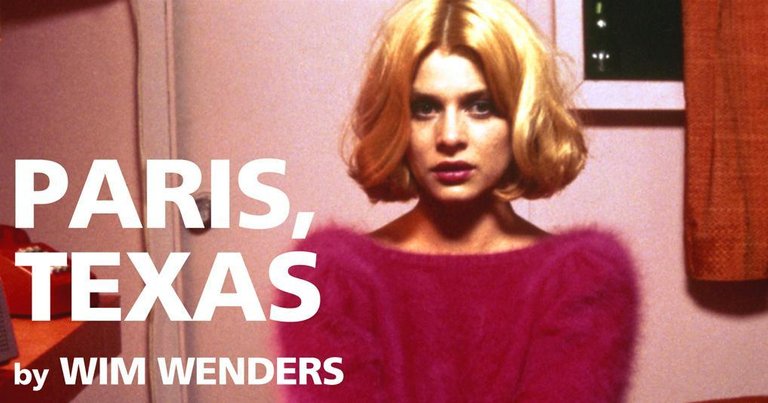 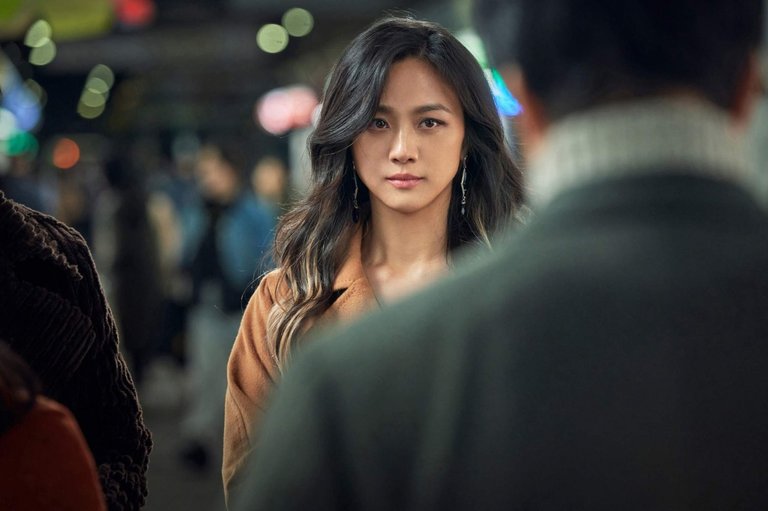 |
|---|
